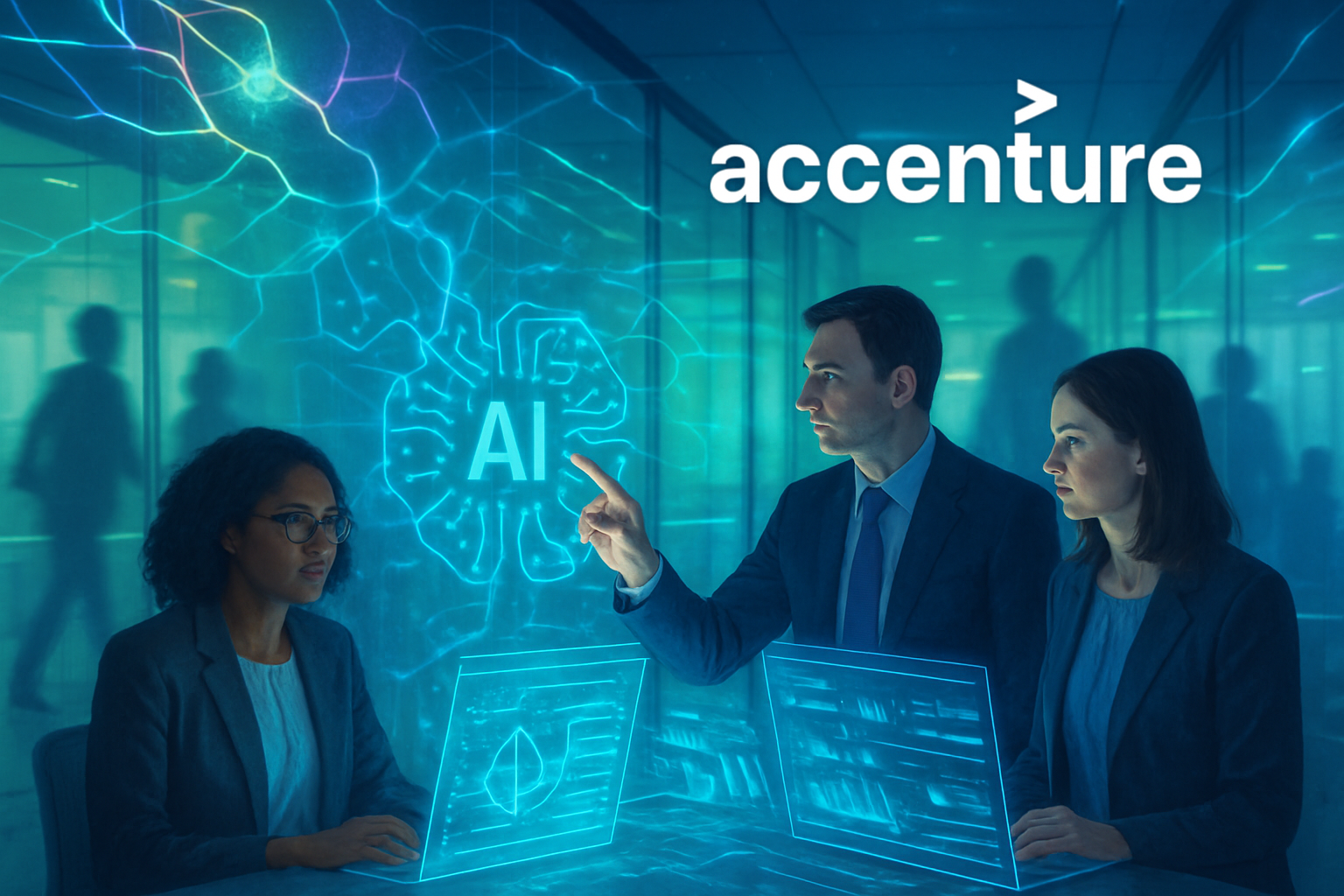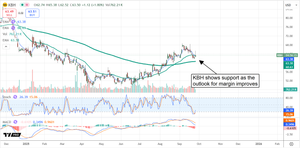
Dublin, Ireland – September 25, 2025 – Global professional services giant Accenture (NYSE: ACN) is undertaking a significant strategic overhaul, recalibrating its approach to Artificial Intelligence (AI) in response to what it describes as "underwhelming" returns from initial AI investments. This bold pivot includes substantial workforce restructuring, marked by both job cuts and a massive, multi-billion-dollar retraining initiative, signaling a profound shift in how the company, and potentially the broader industry, views and implements AI.
The move underscores a growing reality across enterprises: while AI promises transformative efficiency and innovation, its actual value realization has proven more elusive than anticipated. Accenture's candid acknowledgment of these challenges, coupled with its aggressive response, highlights the imperative for companies to not only adopt AI but also to fundamentally reinvent their operational models and workforce capabilities to truly harness its power. The implications for employees, competitors, and the future of work are far-reaching.
Accenture's AI Reinvention: A Deeper Dive into Strategy and Workforce Transformation
Accenture's revised AI strategy is ambitious, positioning the company not just as an AI implementer but as the "reinvention partner of choice" for clients navigating this new era. Central to this vision, articulated in their "Technology Vision 2025," is an emphasis on "AI-powered autonomy" and agentic AI technologies, which enable systems to perform complex tasks independently. CEO Julie Sweet confirmed that the company is actively training its entire global workforce of over 700,000 employees in these advanced AI capabilities, with plans to roll out 100 industry-specific agentic AI tools by the end of 2025. To streamline this effort, Accenture consolidated its services into a new "Reinvention Services" business unit, effective September 1, 2025, aiming for more integrated data and AI solutions.
However, this aggressive push comes after Accenture leadership openly admitted that the tangible returns from AI investments have been less than expected, with Sweet noting on a post-earnings call on September 25, 2025, that "value realization has been underwhelming for many and enterprise adoption at scale is slow, other than with digital natives." Several factors contribute to these muted returns, including client hesitation due to unclear ROI, internal client challenges such as low data readiness and outdated IT systems, and market pressures from analysts like HSBC, who have voiced concerns about potential revenue cannibalization and demands for price reductions driven by AI efficiencies. These headwinds, combined with weaknesses in overall new bookings and federal contract delays, contributed to Accenture's stock price dropping approximately 25-30% year-to-date as of September 20, 2025, despite growing AI bookings.
In response to these challenges and the evolving AI landscape, Accenture has initiated significant workforce adjustments. The company reduced its headcount by 11,000 employees between June and August 2025, following earlier cuts of 19,000 jobs announced in March 2023. More recently, on September 25, 2025, Accenture unveiled an $865 million restructuring program over six months, primarily aimed at realigning its workforce for digital and AI services. This program includes substantial severance costs, with approximately $615 million recorded in Q4 FY25 and an additional $250 million expected in Q1 FY26. Sweet emphasized that while AI is expected to lead to more job cuts, Accenture anticipates a net increase in its workforce during FY26, but also stated that some staff will be "exited" if a "viable path for skilling" in the AI era isn't feasible. The company's workforce strategy is thus a three-pronged approach: upskilling existing employees, talent rotation, and driving efficiencies.
Shifting Tides: Who Wins and Who Loses in the AI Transformation Race
Accenture's strategic pivot and candid assessment of AI returns signal a critical juncture that will undoubtedly create both winners and losers across the financial markets and the broader technology and consulting sectors. Companies agile enough to adapt their offerings and workforce to the new AI paradigm stand to gain significantly, while those clinging to outdated models may face increasing pressure.
On the winning side, companies specializing in AI training platforms and advanced skill development are poised for substantial growth. Firms like Coursera (NYSE: COUR), Udacity, and various specialized AI bootcamps will see increased demand as enterprises, including Accenture and its clients, invest heavily in upskilling their workforces. Similarly, niche AI consulting firms with deep expertise in specific agentic AI applications or industry verticals, unburdened by legacy systems, could capture market share. Technology vendors providing robust AI infrastructure, data readiness tools, and advanced analytics platforms, such as NVIDIA (NASDAQ: NVDA) for AI chips, Palantir Technologies (NYSE: PLTR) for data integration, and various cloud providers like Amazon Web Services (NASDAQ: AMZN), Microsoft Azure (NASDAQ: MSFT), and Google Cloud (NASDAQ: GOOGL), will also likely benefit from increased enterprise AI adoption. Furthermore, companies that can effectively help clients modernize their IT infrastructure to support AI, potentially including systems integrators focused on cloud migration and data architecture, will find new opportunities.
Conversely, firms that are slow to adapt their service portfolios or fail to invest in the AI upskilling of their own employees are likely to lose ground. Traditional IT services companies heavily reliant on manual processes or legacy systems, without a clear and aggressive AI integration strategy, may find their services commoditized or replaced by more efficient AI-driven solutions. Other large consulting firms, such as Deloitte, EY, PwC, and IBM Consulting (NYSE: IBM), will face intense pressure to accelerate their own AI transformations and demonstrate clear ROI to clients, or risk losing market share to Accenture's aggressive "reinvention" narrative. Any company that cannot articulate a compelling vision for how AI creates value beyond mere pilot projects will struggle to secure new business and retain existing clients who are increasingly scrutinizing AI investments.
The Broader Significance: AI's Ripple Effect on the Global Workforce and Economy
Accenture's strategic realignment is more than just a corporate maneuver; it's a potent indicator of broader industry trends and the profound, sometimes disruptive, impact of AI on the global workforce and economy. The acknowledgment of "underwhelming" AI returns, despite significant investment, highlights a critical gap between technological potential and practical, scaled implementation. This gap necessitates not just technological innovation but also fundamental organizational and human capital transformation.
This event fits squarely into a broader trend of AI-driven workforce transformation, where the demand for new skills outpaces the supply, and existing roles are being redefined or automated. The emphasis on massive retraining initiatives, such as Accenture's $1 billion annual investment in learning and development and the training of 700,000 employees in agentic AI, underscores the urgent need for continuous upskilling and reskilling across all industries. This is not merely about learning new software; it's about fostering a culture of adaptability and continuous learning. The potential ripple effects are substantial: competitors in the consulting space will be forced to accelerate their own AI strategies and workforce development programs to remain competitive. Technology partners will need to ensure their solutions are not just powerful but also user-friendly and demonstrably ROI-positive for enterprise clients struggling with adoption.
From a regulatory and policy perspective, Accenture's job cuts, even if accompanied by a net increase in overall headcount, will likely fuel ongoing discussions about workforce displacement, social safety nets, and the ethics of AI in employment. Governments and educational institutions may face increased pressure to provide robust vocational training and support programs to help workers transition into AI-compatible roles. Historically, technological shifts, from the industrial revolution to the advent of personal computing and the internet, have always led to job displacement in some sectors and creation in others. Accenture's situation is a modern echo of these transitions, albeit at an accelerated pace, emphasizing the need for proactive adaptation rather than reactive measures. The challenge now is to manage this transition equitably and effectively, ensuring that the benefits of AI are widely shared, and its disruptive consequences are mitigated.
What Comes Next: Navigating the AI-Driven Future
The coming months and years will be crucial for Accenture and the wider industry as the implications of this strategic pivot unfold. In the short term, Accenture will focus on the execution of its $865 million restructuring program, including the strategic divestitures and severance payments, while simultaneously accelerating the rollout of its 100 industry-specific agentic AI tools. Key metrics to watch will be the growth in AI bookings, the success rate of their massive retraining programs, and, critically, client adoption rates and demonstrable ROI from their new AI-driven solutions. The company's earnings reports will be closely scrutinized for signs that the "underwhelming" AI returns are beginning to turn positive.
Looking further ahead, the long-term success of Accenture's "Reinvention Partner" strategy will hinge on its ability to consistently deliver transformative value to clients, not just in theory but in practice. This will likely involve continuous strategic pivots, potentially including further mergers and acquisitions in the AI space to acquire specialized talent or technology. Market opportunities will emerge for companies that can effectively bridge the gap between AI's potential and its practical application, particularly in areas like data governance, ethical AI implementation, and change management for AI adoption. However, challenges will also persist, including intense competition for top AI talent, the ongoing pressure on pricing for consulting services due to AI-driven efficiencies, and the need to manage client expectations around AI's transformative power.
Potential scenarios and outcomes vary. In an optimistic scenario, Accenture's aggressive strategy pays off, establishing it as the undisputed leader in AI-driven enterprise transformation, attracting top talent, and delivering significant shareholder value. This would set a precedent for other professional services firms. A more challenging scenario could see continued client hesitation, slower-than-expected ROI, and intense competition, leading to further adjustments to Accenture's strategy and potentially prolonged market skepticism. Regardless, the landscape of professional services is irrevocably changing. The emphasis will shift from merely implementing technology to fundamentally reinventing how businesses operate, with AI as the core driver.
Comprehensive Wrap-Up: Navigating the AI Frontier
Accenture's bold strategic pivot, characterized by a forthright acknowledgment of "underwhelming" AI returns, significant job cuts, and an unprecedented commitment to workforce retraining, serves as a powerful microcosm of the broader challenges and opportunities presented by Artificial Intelligence. The key takeaway is clear: the integration of AI into enterprise operations is not a simple technological upgrade but a profound organizational transformation requiring strategic foresight, substantial investment in human capital, and a willingness to make difficult decisions about workforce composition.
Moving forward, the market will undoubtedly be defined by a period of intense disruption and innovation. Companies that embrace continuous learning, invest proactively in upskilling their employees, and develop clear, measurable strategies for AI value realization will be best positioned for success. Accenture's actions highlight that even industry leaders are not immune to the disruptive forces of AI and must adapt swiftly to maintain their competitive edge. The emphasis on "agentic AI" and industry-specific solutions points towards a future where AI is deeply embedded and highly specialized, requiring a new breed of expertise.
Investors should closely monitor Accenture's (NYSE: ACN) upcoming earnings reports for signs of improved AI bookings, increased client adoption of their new "Reinvention Services," and the tangible impact of their restructuring and retraining initiatives on profitability and growth. Beyond Accenture, it will be crucial to observe how other major consulting firms and technology providers respond to this benchmark, particularly regarding their own AI strategies, workforce development programs, and their ability to articulate and deliver measurable ROI from AI investments. The journey into the AI frontier is just beginning, and Accenture's current moves offer a stark, yet instructive, glimpse into its challenging and transformative path.
This content is intended for informational purposes only and is not financial advice.





